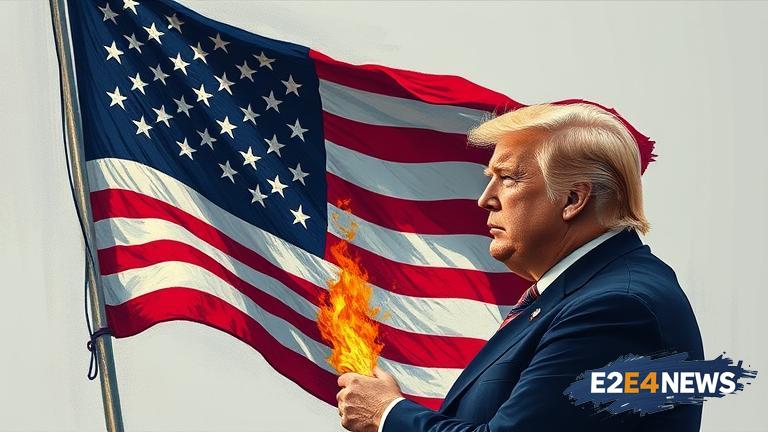President Trump has unveiled a plan to prosecute individuals who burn the US flag, a move that has sparked intense debate and raised concerns about free speech and First Amendment rights. The plan, which was announced on social media, aims to hold people accountable for desecrating the American flag. Trump stated that burning the flag is a disrespectful act that undermines the values and principles that the country was founded upon. He argued that the flag is a symbol of national pride and unity, and that burning it is a form of protest that goes too far. The plan has been met with criticism from civil liberties groups, who argue that it infringes upon the right to free speech and peaceful protest. They claim that the Supreme Court has consistently ruled that flag burning is a form of protected speech under the First Amendment. The American Civil Liberties Union (ACLU) has condemned the plan, stating that it is an attempt to suppress dissent and stifle free speech. The organization argues that the government should not be able to dictate how citizens express themselves, as long as they are not causing harm to others. Trump’s plan has also been criticized by lawmakers, who argue that it is unconstitutional and would be difficult to enforce. Some have pointed out that the plan may be a distraction from more pressing issues, such as the economy and healthcare. Despite the criticism, Trump has maintained that his plan is necessary to protect the flag and the values it represents. He has argued that other countries have laws that prohibit flag desecration, and that the US should follow suit. The debate over flag burning has been ongoing for decades, with some arguing that it is a form of patriotic expression and others claiming that it is a form of disrespect. The Supreme Court has ruled on the issue several times, most notably in the 1989 case Texas v. Johnson, which held that flag burning is a form of protected speech. The court has also ruled that the government cannot prohibit flag burning unless it can prove that the act is likely to incite imminent lawless action. Trump’s plan has sparked a renewed debate over the issue, with some arguing that it is time to reconsider the Supreme Court’s ruling. Others have argued that the plan is a form of political posturing, and that it is unlikely to be enacted into law. The plan has also raised concerns about the potential consequences for individuals who are prosecuted for flag burning. Some have argued that the plan could lead to a chilling effect on free speech, as people may be reluctant to express themselves if they fear prosecution. Others have pointed out that the plan could be used to target certain groups, such as protesters or activists. The debate over Trump’s plan is likely to continue in the coming weeks and months, as lawmakers and civil liberties groups weigh in on the issue. As the debate rages on, one thing is clear: the issue of flag burning is complex and multifaceted, and there are valid arguments on both sides. Ultimately, the question of whether to prosecute individuals for flag burning will depend on how one weighs the importance of free speech against the need to protect national symbols. The plan has also sparked a discussion about the role of the government in regulating speech and expression. Some have argued that the government should not be able to dictate what forms of speech are acceptable, while others have claimed that the government has a responsibility to protect citizens from harmful or offensive speech. The issue is further complicated by the fact that flag burning is often used as a form of protest or dissent, and that it can be seen as a form of patriotic expression. As the debate continues, it is likely that the Supreme Court will be called upon to weigh in on the issue once again. The court’s ruling could have significant implications for the future of free speech in the US, and could potentially set a new precedent for how the government regulates speech and expression. In the meantime, Trump’s plan has sparked a renewed conversation about the importance of free speech and the role of the government in protecting national symbols. The plan has also highlighted the ongoing debate over the meaning and significance of the US flag, and the ways in which it can be used as a symbol of patriotism and unity. As the US continues to grapple with the issue of flag burning, one thing is clear: the debate is complex, multifaceted, and unlikely to be resolved anytime soon.
